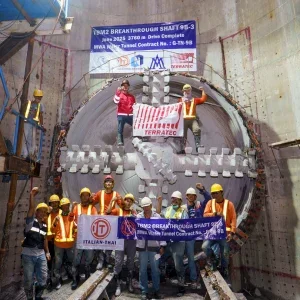Metro Vancouver has announced plans to seek a replacement contractor for the Seymour-Capilano tunnels. It claimed it had no option but to terminate Bilfinger Berger’s involvement on the project over the contractor’s suspension of part of the works since January, despite efforts to agree a new construction plan and method to reduce the safety risk caused by geological conditions.
Bilfinger Berger claimed that the geology along the alignment was significantly different from the assumed conditions that were presented in the bid documents. The contractor claimed that the construction planning and method were, therefore, not suited to the ground conditions expereinced at the site.
Confirming that its contract has been terminated, Bilfinger Berger claimed the move by the client to be unjustified and added that their dispute was now the subject of litigation.
The contractor added further that it has taken appropriate measures to cover the project risks from Seymour-Capilano and that the setback was not expected to impact its financial results.
Bilfinger Berger was building twin 7.2km long raw water and treated water transfer tunnels in Vancouver, Canada. About 2.5km of the former tunnel had been bored, and approximately 2.2km of the latter, when the TBMs were stopped over safety concerns.
Those concerns focused on a zone where there had been incidents of falling rock in the broken, unstable ground, with some injuries as a result. As a consequence, the provincial safety authority called for the TBM drives – with a pair of 3.8m diameter Robbins machines – to be halted.
The drives were being undertaken on a 2.3% downhill gradient and the geology, cited as work started, comprised granodiorite and metavolcanic strata, which were predicted to be competent. However, it was noted that overburden was up to 640m, and there was consequent unpredictability (T&TNA, December 2006, p23-26).
While work continued away from the TBM zones, such as to advance the final support and lining, the parties were trying to agree an alternative solution to the construction challenge. Discussions continued following disagreement over the first plan, until the contract was cancelled in late May.
However, at the end of May the client announced that Bilfinger Berger’s ‘right to perform further work has been terminated’ because, it said, of the contractor’s ‘refusal to move forward’. No statement was immediately available from the contractor.
In its own statement, the client added that it ‘will now take the necessary steps to secure a replacement contractor and complete the tunnels’.
Metro Vancouver is being assisted on the scheme by resident engineer Hatch Mott MacDonald, geotechnical consultant Golder Associates, and construction manager Pacific Liacion & Associates which is part of SNC Lavalin.







